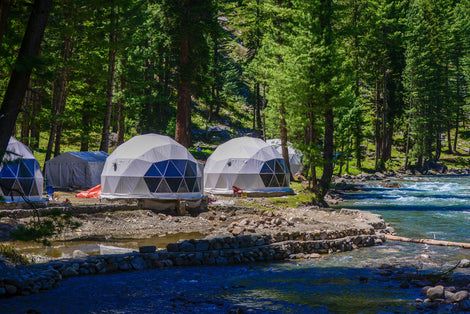Setting Up a Reliable Backup Power System for Your Home
When the lights go out, having a backup power system isn't just convenient. It keeps life moving. Whether you're running appliances during a storm or keeping the lights on when the grid fails, a backup system gives you the kind of security you can't get otherwise. It's about feeling prepared. Keeping your home powered when everyone else is in the dark adds a level of comfort and control that can make a major difference.
You don’t have to wait for the worst to happen to think about backup power. As homes rely more on electricity to run everything from internet routers to refrigerators, the need for consistent energy has only grown. Setting up a system that runs on solar power and stores it in batteries means you have energy when others don’t—rain or shine, throughout every season. If you’re aiming to make your property more self-reliant, this is one of the best ways to begin.
Understanding Backup Power Systems
A backup power system helps when your home's main source of power goes down. Instead of being left without any electricity, it keeps your appliances and lights running by switching to backup energy. In solar systems, the source is typically energy stored in batteries that were charged by sunlight during the day. The transition happens automatically. You don’t even have to flip a switch.
There are two common types of systems:
1. Grid-tied with battery backup – This setup stays connected to the grid but adds battery storage. It helps carry temporary loads during outages.
2. Off-grid – This type runs independently. Solar panels generate electricity, and batteries store it for anytime use, even if the grid is down.
Off-grid backup systems offer more reliability if your goal is full independence. Since they don’t rely on power companies, they are a strong option for places where outages are frequent or homes are built far from local infrastructure. They’re also a good fit for emergency-ready families. When installed and sized properly, an off-grid system can carry you through blackouts without missing a beat.
Picture a weeklong summer storm that knocks out the grid for several days. A home with off-grid solar keeps powering forward thanks to stored sunlight energy. The fridge stays cool. The lights stay on. Life continues with little disruption.
Selecting The Right Batteries For Solar Panels
The batteries in your backup system are the heart of it all. They determine how long your home stays powered when there’s no sun or grid connection. Choosing the right batteries makes all the difference. With so many types available, it can feel overwhelming, but it helps to start by thinking about how you use energy each day.
Here are a few types you’re most likely to find:
- Lithium-ion: Lightweight, long-lasting, and fast to charge. Performs well in most climates.
- Lead-acid: More affordable to start with, but they take up more room and require regular checks.
- Saltwater: A safer choice for households with kids or pets. These are less common and usually more expensive.
To make the best choice, consider the following:
- How many kilowatt-hours does your home use daily?
- Will your system back up just your essentials or the whole house?
- Do you live in a hot, cold, or mixed climate?
- Where will your batteries be stored—indoors, in a garage, or in a shed?
Having the right battery size is key. Too small, and you may run out of charge when you need it most. Too large, and you might not generate enough solar to fully charge them. Balancing battery size with your actual usage habits keeps everything running smoother. If your area experiences wide temperature swings, be sure to pick a type of battery that works well in those conditions too.
Installation And Maintenance Tips
After selecting the right batteries and solar panels, it’s time to install the system. This is when all the parts come together. A strong installation will set your system up for long-term performance. Trying to install everything without proper planning can lead to breakdowns, stress, and lower efficiency. Think of it as a major house upgrade—not something to take lightly.
The main steps of installing an off-grid solar system include:
- Sizing it based on your household’s energy needs
- Placing solar panels where they’ll get the most direct sunlight
- Hooking up the inverter, battery bank, and charge controller
- Laying out wiring and safe disconnects
- Setting up system controls for charging and switching power flows
It’s best to work with professionals to make sure everything is safe and built to code. Wiring mistakes or misjudged system sizing can become problems quickly if not done the right way from the start. A solid install helps avoid future headaches.
Once installed, your system does need regular checks, though maintenance is usually pretty simple. Here are a few helpful tasks to keep things working right:
- Monitor battery condition two to four times a year, depending on battery type
- Wipe down solar panels and check for anything that could block light
- Watch the inverter for alerts or error messages
- Inspect and secure wiring to catch wear and tear early
Think of it like basic car care. A few check-ins each year go a long way. Skipping maintenance may not seem like a problem at first, but over time, it can reduce the life of your system. If your region gets tough seasons—winter snow or spring storms—keep an eye out for shifts or wear once the weather calms.
Benefits Of A Reliable Backup Power System
A dependable backup system means you don’t have to stress when the grid goes down. Meals don’t get interrupted, gadgets keep charging, and you don’t lose the food in your fridge. There’s a comfort in knowing you’re prepared, especially when others in your neighborhood are left without power.
Choosing off-grid solar brings other bonuses too. For starters, you rely less on traditional utilities. If you care about reducing your carbon footprint, it’s a smart upgrade. You can use stored solar energy for much of your daily power, which lowers demand on fossil fuels.
Some other real-life perks include:
- Always-on electricity, whether grid power is up or not
- Less need for loud or messy fuel-powered generators
- More protection for devices like computers and appliances
- A system you can grow as your needs change
This kind of system isn’t just for today. It adjusts with you. If your family gets bigger or your power needs grow, you can scale things without starting from scratch. That kind of flexibility helps you look ahead with less worry.
Ensuring Your Home Stays Powered
To really make your system work for you, it’s helpful to tighten up your daily energy habits. Knowing how and when you use electricity makes your system more efficient, giving your batteries the most range possible. When your usage lines up with your storage, everything feels natural.
Here are a few tips that stretch your energy longer:
- Switch to LED bulbs and efficient appliances
- Don’t run energy-hungry items like electric dryers at night
- Use daylight instead of turning on all your lights
- Add timers to devices that don’t need to be powered 24/7
- Track power usage through a battery app to catch big jumps early
If you ever notice your system running out of charge faster than it should, it’s probably time to reassess your habits or think about upgrading. Working with an experienced team helps guide those decisions so you can avoid energy gaps or wasted money.
Whether it's heat waves, a week of ice storms, or power grid maintenance, a good system is built to keep you powered through it all. With reliable components and a little planning, it becomes part of your home that just works—quietly and smoothly.
Keep More Control with the Right Power Setup
Choosing an off-grid backup power system is about getting back control. It means fewer disruptions and more flexibility when life throws curveballs. With solar power and battery backup, what used to be a stressful outage becomes just another normal day.
A strong system supports your everyday routines while doubling as your protection plan for tougher times. When it’s built and installed by people who know what they’re doing, your energy system becomes as dependable as your roof or heating. It’s always there, working in the background so you can focus on what’s most important in your daily life.
Your home deserves a steady and reliable power supply throughout the year. Discover how off-grid solutions enhance energy independence. Explore Green Vista Living's collection of solar kits and find the best batteries for solar panels for sale that fit your needs and lifestyle for true self-sufficiency.







